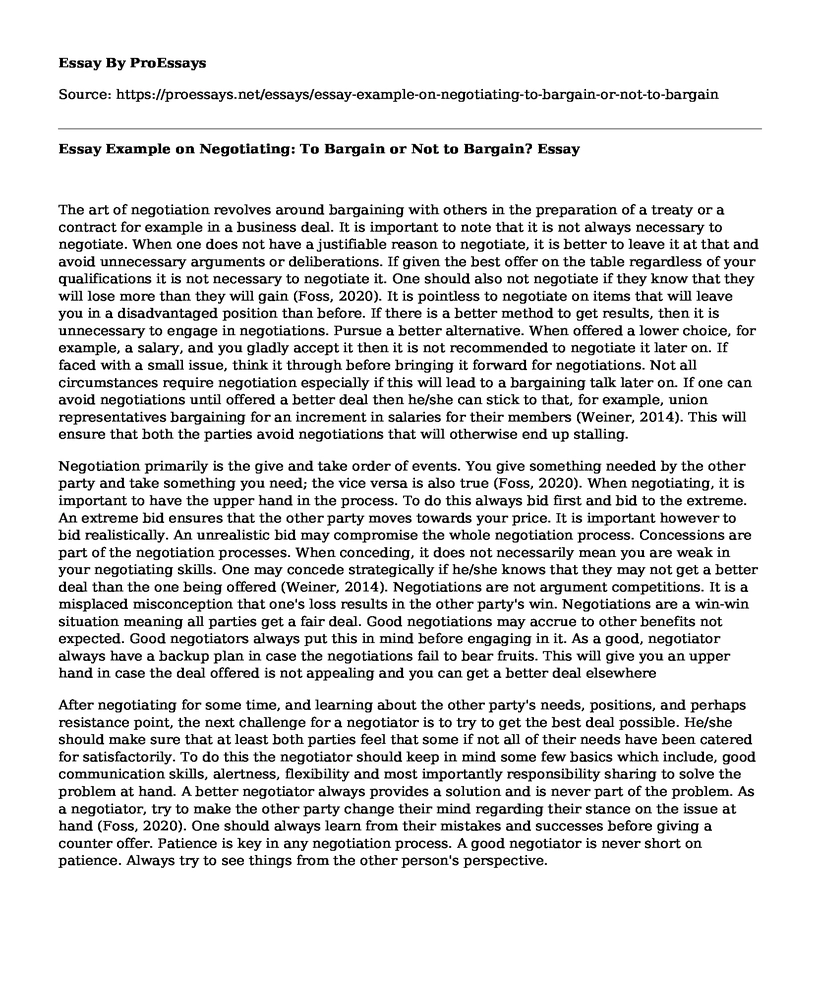The art of negotiation revolves around bargaining with others in the preparation of a treaty or a contract for example in a business deal. It is important to note that it is not always necessary to negotiate. When one does not have a justifiable reason to negotiate, it is better to leave it at that and avoid unnecessary arguments or deliberations. If given the best offer on the table regardless of your qualifications it is not necessary to negotiate it. One should also not negotiate if they know that they will lose more than they will gain (Foss, 2020). It is pointless to negotiate on items that will leave you in a disadvantaged position than before. If there is a better method to get results, then it is unnecessary to engage in negotiations. Pursue a better alternative. When offered a lower choice, for example, a salary, and you gladly accept it then it is not recommended to negotiate it later on. If faced with a small issue, think it through before bringing it forward for negotiations. Not all circumstances require negotiation especially if this will lead to a bargaining talk later on. If one can avoid negotiations until offered a better deal then he/she can stick to that, for example, union representatives bargaining for an increment in salaries for their members (Weiner, 2014). This will ensure that both the parties avoid negotiations that will otherwise end up stalling.
Negotiation primarily is the give and take order of events. You give something needed by the other party and take something you need; the vice versa is also true (Foss, 2020). When negotiating, it is important to have the upper hand in the process. To do this always bid first and bid to the extreme. An extreme bid ensures that the other party moves towards your price. It is important however to bid realistically. An unrealistic bid may compromise the whole negotiation process. Concessions are part of the negotiation processes. When conceding, it does not necessarily mean you are weak in your negotiating skills. One may concede strategically if he/she knows that they may not get a better deal than the one being offered (Weiner, 2014). Negotiations are not argument competitions. It is a misplaced misconception that one's loss results in the other party's win. Negotiations are a win-win situation meaning all parties get a fair deal. Good negotiations may accrue to other benefits not expected. Good negotiators always put this in mind before engaging in it. As a good, negotiator always have a backup plan in case the negotiations fail to bear fruits. This will give you an upper hand in case the deal offered is not appealing and you can get a better deal elsewhere
After negotiating for some time, and learning about the other party's needs, positions, and perhaps resistance point, the next challenge for a negotiator is to try to get the best deal possible. He/she should make sure that at least both parties feel that some if not all of their needs have been catered for satisfactorily. To do this the negotiator should keep in mind some few basics which include, good communication skills, alertness, flexibility and most importantly responsibility sharing to solve the problem at hand. A better negotiator always provides a solution and is never part of the problem. As a negotiator, try to make the other party change their mind regarding their stance on the issue at hand (Foss, 2020). One should always learn from their mistakes and successes before giving a counter offer. Patience is key in any negotiation process. A good negotiator is never short on patience. Always try to see things from the other person's perspective.
References
Foss F. (2020). Four Times to Negotiate Your Salary (and 3 Times Not to). TheMuse. Retrieved from https://www.themuse.com/advice/4-times-to-negotiate-your-salary-and-3-times-not-to
Weiner C. (2014). More Art Than Skill: The Give and Take of Negotiating. fastCompany. Retrieved from https://www.fastcompany.com/3028370/more-art-than-skill-the-give-and-take-of-negotiating
Cite this page
Essay Example on Negotiating: To Bargain or Not to Bargain?. (2023, Apr 24). Retrieved from https://proessays.net/essays/essay-example-on-negotiating-to-bargain-or-not-to-bargain
If you are the original author of this essay and no longer wish to have it published on the ProEssays website, please click below to request its removal:
- Parental Love
- Mental Health and Stigma Essay
- Essay Sample on Gender and Colonialism: Corrie Decker - History
- Essay Example on 20th Century Dating: Evolving Perception, Same Role
- Essay Example on Adolescence: Transitional Stage to Adulthood
- Race, Delinquency & Neighbourhoods - Essay Sample
- Lifeblood of the Southwest: Colorado River's Impact on Communities - Research Paper







